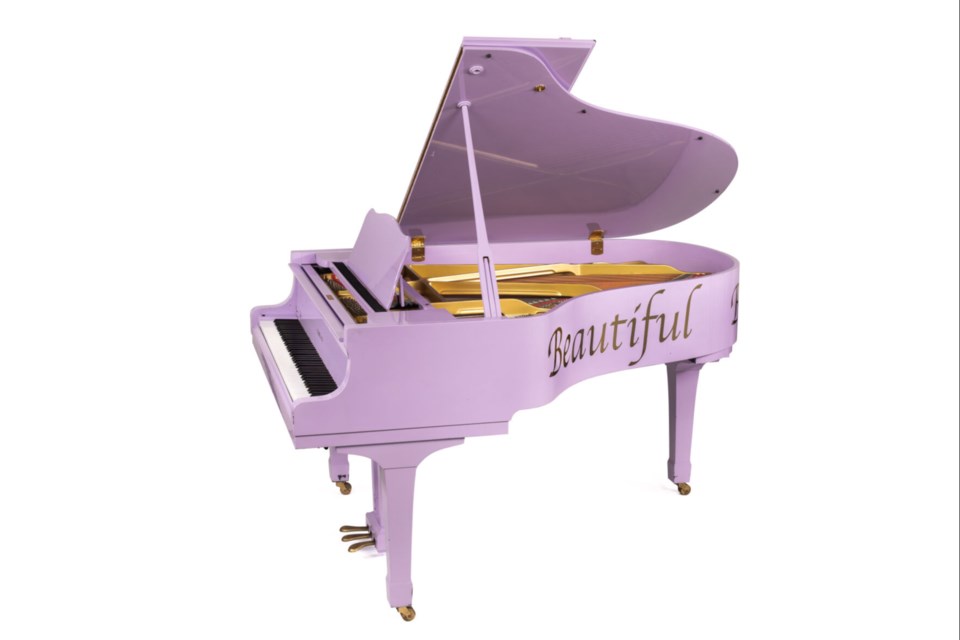This fall, some of the rarest instruments of their kind have joined the Musical Instrument Museum’s (MIM) special exhibition “Treasures: Legendary Musical Instruments” — including ancient flutes to priceless instruments owned and played by musical icons like Prince and Eric Clapton.
Since it first opened in November 2021, more than 51,500 guests have explored the exhibition, which celebrates the power of music across 6,000 years of history. The original exhibit closed in October, but the MIM has reopened the exhibit as “Rediscover Treasures: Legendary Musical Instruments.” It now features 28 new acquisitions and loans of historical significance for guests to explore alongside exhibition favorites like the Erard grand piano, Amati violin and viola, ancient Mesopotamian lyre fragments and Jimi Hendrix’s Black Widow electric guitar.
Featured historic instruments in Rediscover Treasures include:
-
Hochbrucker pedal harp, Germany, c. 1720. Jacob Hochbrucker’s ingenious pedal harp design represents a revolutionary step in harp history. Single-action pedal harps would become one of the most popular instruments in the mid-eighteenth century, especially among the French aristocracy, including Marie Antoinette. Today, only four known original Hochbrucker pedal harps remain.
-
Emperor Go-Daigo’s hitoyogiri, Japan, early 14th century. This extraordinary Japanese instrument is one of two known hitoyogiri flutes in existence owned and treasured by Japanese emperor Go-Daigo (1288–1339). The body is profusely decorated with multiple layers of lacquer and gold powder and features elaborate dragon and cloud motifs. This loan is courtesy of the Takao Oikawa Family.
-
Crystal flute by Claude Laurent, France, 1809. A watchmaker and mechanic by trade, Laurent was a musician at heart, which led him to develop innovative glass flutes in 1806. Unaffected by temperature and humidity, these groundbreaking “crystal flutes” were stable, even-toned and well-tuned instruments.
-
“The First Ukulele,” Hawaii, c. 1879. Likely crafted by Portuguese immigrant Jose do Espirito Santo, this instrument is thought to be the first Hawaiian-made ukulele. Despite its delicate construction and small size, this ukulele remains in playable condition and produces remarkable volume. This loan is courtesy of Shawn Yacavone at Ukulele Friend.
Rediscover Treasures will also feature iconic, celebrity-owned instruments including:
-
Prince’s Purple Yamaha Grand Piano. This purple Yamaha grand piano featuring the word “beautiful” written in metallic gold was used during Prince’s Jam of the Year tour from 1997 to 1998 following the release of his triple album Emancipation. The artist danced atop the piano during live performances, as seen in the “Somebody’s Somebody” music video. Also on display is Prince’s green stage wardrobe featured in the same music video, as well as a custom “Black Power” Lākland bass. Bassist Rhonda Smith commissioned this instrument and gifted it to Prince in the late ‘90s. Loans are courtesy of The Estate of Prince Rogers Nelson and Paisley Park.
-
“Brownie,” Eric Clapton’s 1956 Fender Stratocaster. This two-color sunburst electric guitar was Clapton’s first Stratocaster, and it became a key part of the guitarist’s signature tone. Purchased by Clapton in a London music shop in 1967, the guitar can be heard on Clapton’s early solo classics, such as “Layla” and “Bell Bottom Blues.” This loan is courtesy of the Museum of Pop Culture in Seattle.
-
1958 Gibson Flying V electric guitar. Created to compete with popular guitars like the Fender Stratocaster, the modernistic Flying V was initially so controversial that only 81 examples were shipped in 1958, making originals incredibly rare. This particular Flying V has been played by many world-class guitarists, including Joe Bonamassa, Eric Johnson, and Jack Pearson. An anonymous loan.
-
Lionel Hampton’s Deagan vibraphone, c. 1935. This one-of-a-kind gold “King George” model vibraphone was custom-made for Lionel Hampton, and remains the only example built to the Deagan company’s most deluxe trim level. Known as the “King of the Vibes,” Hampton played on recordings by Louis Armstrong and others, and he effectively introduced the vibraphone to jazz music.
-
Dizzy Gillespie’s Martin Committee trumpet. Regarded as one of the most iconic trumpeters of all time, Gillespie played an equally iconic trumpet with a distinctive angled bell. The trumpet on display is one of Gillespie’s personal instruments; built in 1962, it features gold plating, custom engraving and his signature upturned bell in sterling silver. This loan is courtesy of Joey DeFrancesco.
Throughout the exhibition, original video content uncovers these instruments’ stories and the traditions they represent with performances and interviews by museum curators and notable musicians.
For information about MIM’s current special exhibition, visit MIM.org.
This exhibition is made possible by presenting sponsor U.S. Bank as well as the Arizona Office of Tourism; John & Joan D’Addario Foundation; John and Mary Ann Mangels; Christine Lindley; Carolyn and John Friedman; Babette and Richard Burns; Jane and John Guild; Marcia and Jim Lowman; and Ann Phillips.
The MIM enriches the world by collecting, preserving and making accessible an astonishing variety of musical instruments and performance videos from every country in the world. MIM offers guests a welcoming and fun experience, incomparable interactive technology, dynamic programming and exceptional musical performances. MIM fosters appreciation of the world’s diverse cultures by showing how humans innovate, adapt and learn from each other to create music — the language of the soul.
The Musical Instrument Museum is located at 4725 E. Mayo Blvd. in Phoenix. For general museum information and a full schedule of events, visit MIM.org or call 480-478-6000.



